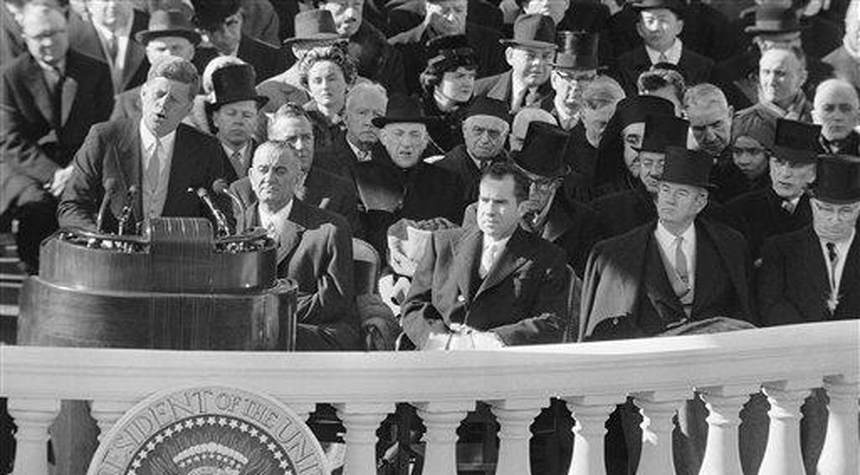“Ask not what your country can do for you — ask what you can do for your country.”
“We must confront that our nation was founded by genocide and we maintain global power through neocolonialism.”
The first quote above, of course, is from John F. Kennedy’s January 21, 1961 inaugural address — and remains arguably the most famous quote in the annals of inaugural history. The second quote is from an August 2017 tweet by Rep. Ilhan Omar (D-MN) — and she’s said far worse.
Imagine flipping the script. What would happen to a Democrat lawmaker today if he or she uttered that famous admonishment from JFK — let alone actually believed it? I got this one. He or she would be excoriated on CNN (“The Most Trusted Name in News”) and PMSNBC, called every obscene name in the book on social media, and run out of town on a rail — by his or her own party.
And, if JFK had declared during his inaugural address that America was “founded by genocide” and maintains global power through “neocolonialism”? He would have immediately been declared a Communist on both sides of the political aisle, hearings would have been held in both chambers of Congress, and all hell would have broken out across the country.
The overarching question is, how the hell did we get here?
How did the Democrat Party of John F. Kennedy morph into the Democrat Party of Ilhan Omar, Alexandria Ocasio-Cortez, Nancy Pelosi, and the radical Left’s organ grinder monkey in the White House?
Victor Davis Hanson, a distinguished fellow of the Center for American Greatness, author, and Fox News contributor shared his thoughts on the Democrat Party in an op-ed posted on FoxNews.com on Saturday. “How did the Democratic Party of JFK, Bill Clinton turn into a woke neo-Maoist movement?” he asked.
“In the old days, Democrats had predictable agendas,” VDH wrote, “supposedly focused on individual rights, the ‘little guy,’ and distrust of the military-industrial complex.”
“Democrats talked nonstop about the working man. They damned high gas and electricity prices that hurt consumers. Almost every liberal cause was couched in terms of the First Amendment, whether it was the right to shout obscenities, view pornography, or bring controversial speakers to campus.
“The Supreme Court was sacred. With a liberal-packed court led by Chief Justice Earl Warren, progressive justices restrained the supposedly harebrained initiatives of hick right-wing populists.
“Democratic congressmen investigated the CIA and FBI seemingly nonstop.”
Obviously, I bolded that font because today the CIA and FBI serve as virtual arms of the Democrat Party.
“Progressive political cartoonists caricatured the Pentagon’s top brass as obese, buffoonish-looking clerks with monstrous jowls. The ‘revolving door’ was a particular leftist obsession. Democrats blasted generals who retired from the military, then went straight to defense contractor boards and got rich.
“Unions were sacred. So farm union kingpins such as Cesar Chavez headed to the border to confront (or physically assault) any would-be undocumented immigrant ‘scabs.'”
And this:
“Politicians such as Sen. Chuck Schumer (D-NY), and Bill and Hillary Clinton railed against the cheap labor provided by undocumented immigrants, which drove down American wages.”
Imagine that. “That was then,” VDH wrote, “this is now.”
So what the hell happened, as VDH sees it?
“Liberals became rich progressives who transmogrified into really rich hardcore leftists. Suddenly, not just millionaires but multibillionaires such as Mark Zuckerberg, Bill Gates, Jay-Z, Oprah Winfrey, and a host of other celebrities and CEOs were cool and hip.
“Deified Silicon Valley monopolists ensured that leftist candidates were usually better funded than were conservatives.
“‘Dirty money’ disappeared from Leftist invective.
“The Fortune 500 became mostly a list of billionaires who did not make their money the old-fashioned way of manufacturing, assembly, construction, farming, transportation, or oil and gas production.
“The left got drunk on the idea that it now had its hands on the money and influence in America. So it systematically began targeting institutions and leveraged them not from the noisy street with empty protests but from within.”
Bingo. Leftism has metastasized within — everywhere from professional sports to corporate boardrooms — in many cases, leaving conservatives asking, “Wait — what just happened?”
And institutions once revered by the Democrat Party?
“Suddenly, the once-revered Supreme Court, now with a majority of conservative justices, became an obstacle to democracy and had to be packed or restructured.
“The First Amendment was redefined as a bothersome speed bump that slowed progress. It needlessly protected noisy conservatives and their backward values.
“The CIA, FBI and Pentagon were suddenly OK — if staffed with the right people. Their clandestine power, their chain-of-command exemption from messy legislative give-and-take and their reliance on surveillance were now pluses in the correct hands.
“These institutions became allies, not enemies, and so their powers were augmented and unchecked.”
“The media glitterati were no longer to be mocked as empty suits and pompadour fools, but rather treated as useful foot soldiers in the revolution,” VDH correctly nailed. “The union shop was written off as a has-been enclave of old, white dinosaurs — an ossified, shrinking base of the Democratic Party.”
And what of the “old white dinosaurs” of the party of John F. Kennedy, Hubert Humphrey, Daniel Patrick Moynihan, and Walter Mondale?
“Traditional Democrats were seen increasingly as namby-pamby naifs who rotated power with establishment Republicans. Now with money and institutions in its hip pocket, and cool popular culture on its side, the Left would not just damn American institutions but infect them — alter their DNA and reengineer them into revolutionary agencies.”
“So here we are with a near one-party system of a weaponized fused media, popular culture, and the administrative state — confident that all Americans will soon agree to love Big Sibling,” said VDH.
Chilling stuff. Because Victor Davis Hanson is right.
But conservatives are fighting back, perhaps with more conviction than at any time in recent history.
I have said before that I believe the fight against the insidious cancer of Critical Race Theory — from parents wrecking school board members to politicians like Florida Gov. Ron DeSantis standing up and saying, “Not in my state” — can serve as a catalyst to go after other Leftist policies and initiatives.
But we must continue to bring the heat. It’s way past time for GO TIME.









